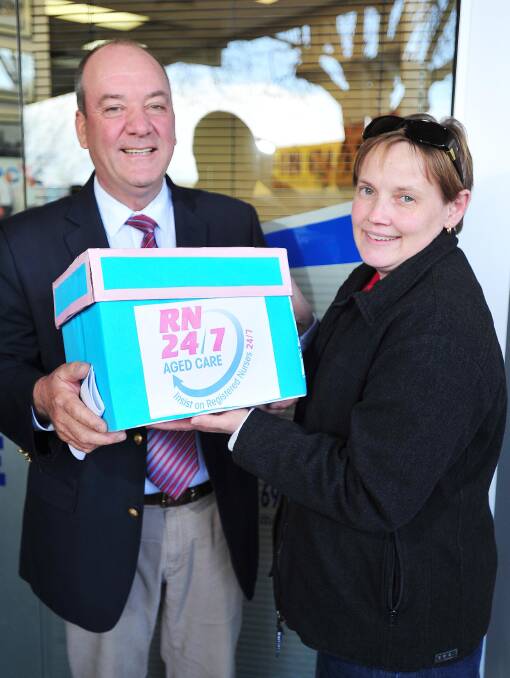
A recent parliamentary inquiry that found registered nurses should be on duty in nursing homes at all times has been hailed a “victory for common sense” by one Wagga nurse.
Subscribe now for unlimited access.
$0/
(min cost $0)
or signup to continue reading
A NSW upper house inquiry recommended the requirement for registered nurses to be on duty in aged care facilities at all times be retained and new programs and incentives to attract them to work in rural and regional areas be explored.
Wagga-based members of the NSW Nurses and Midwives Association have been lobbying the government vigorously this year to support the requirement and submitted a petition with around 5000 signatures to member for Wagga Daryl Maguire in September.
Jenny McKenzie, a Wagga-based palliative care nurse, said the findings of the inquiry had vindicated the campaign.
“I think it’s vitally important we keep the registered nurses in aged care 24/7,” she said.
“I think it’s a victory for common sense really.”
Ms McKenzie said the next step to ensuring there were enough registered nurses in the system to service the aged care sector was to address “inequity” in terms of pay.
“(Acute care nurses) are paid more than nurses who work in an aged care setting and they work just as hard and I think they deserve equal pay,” she said.
Meanwhile, a Charles Sturt University Wagga academic who made a submission to the inquiry in August believes its findings have been “so positive”, but there is more to do.
Maree Bernoth said with the needs of those in aged care increasing in complexity, the system needed to ensure it was resourced well enough to ensure they could access the care they needed.
“We’re keeping people at home for as long as we can, so it’s only really frail old people going into residential aged care,” Dr Bernoth said.
“Something like 80 per cent of people in aged care need high-level care. We need people in the aged care sector who have the skills and knowledge to provide that care – Certificate III nurses and endorsed nurses don’t have those skills.”
Dr Bernoth said the report from the inquiry that acknowledged the different challenges registered nurses in rural and regional areas faced was a positive step for Wagga. “Those needs need to be investigated and opportunities explored,” she said.

